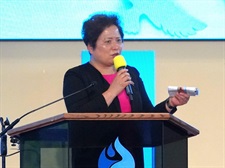
Eunmee Shim
President of Adventist HealthCare Fort Washington Medical Center
Member of MHA Board of Trustees
MHA: Why did you pursue a career in health care?
ES: I would love to be able to say I felt a strong calling early in life to work in health care, but the truth is when I was growing up I believed I was destined to become a writer. In fact, my goal was to win the Nobel Prize in literature.
That’s what I thought I would do when I went to college, but my mother had different ideas for me.
I’m from Korea and went to college at a time when Korea saw its most turbulent period advocating for democracy. On a daily basis, students were demonstrating in the street and fighting with police and the military.
My mother knew that I was a very idealistic person and would do anything to support a cause I felt passionate about. She thought that if I studied literature in college, that I would potentially find myself in dangerous situations. She insisted that I follow in my sister’s footsteps and go to nursing school.
That’s how I started my nursing career, but I quickly grew to realize how much I love caring for people. I love making a difference for others and I decided that I was going to become a great nurse. By the time I graduated, I had fallen in love with nursing and enjoyed my career more than I ever imagined.
MHA: Where did you grow up?
ES: I was born on a small, rural island in Korea. I didn’t see electricity until I was in the fifth grade and TV was first introduced to me in middle school. It was a very remote village where even the Korean War decided to bypass.
I grew up in a very traditional setting and my father had very strong opinions about what roles boys and girls ought to play. In his mind, it was not necessary for girls to attend college. I’m thankful that because of my mother’s encouragement, I was able to attend Sahmyook University in Seoul, Korea and graduate with a Bachelor of Science degree in Nursing. After I moved to the U.S., I attended and graduated from Columbia University School of Nursing with a Master of Science degree in Nursing Informatics.
MHA: When you think, back on what you’ve done in your career and with your team, is there something that stands out that you’re most proud of?
ES: I’ve had a lot of wonderful and challenging experiences in my life. I’ve lived on different continents and experienced different cultures, which has given me a unique perspective and has always guided me towards becoming a leader.
We face challenges at Fort Washington Medical Center, but despite that, we’ve made a lot of progress from when we first joined in Adventist HealthCare in 2019. We went from being a Leapfrog Safety Grade D hospital to now being very close to a Leapfrog Safety Grade A hospital. We’re continuing to grow and add services to better serve our community.
The most impressive thing about our team here is that they are resilient. We were daunted by COVID-19 and were one of the most heavily affected areas around the country, but our team was able to rise above those seemingly insurmountable challenges to be where we are today. I’m very proud of the team that we have at Adventist HealthCare Fort Washington Medical Center and how we handled – and continue to handle – COVID. Through it, we became a stronger hospital.
MHA: Is there a hospital program that you feel has had a really big impact on your community that you’d like to talk about?
ES: In Prince George’s County, we have far fewer physicians than we need to keep the community healthy. Residents in our area migrate outside of the county for over 80% of their health care needs and our goal is to provide world-class care close to home for our patients.
We are focused on recruiting and employing more specialty physicians so we can address the chronic conditions that plague our community, such as diabetes. We are working to expand resources around prevention, early diagnosis and intervention, and self-management.
Thanks to our elected officials, Congressman Steny Hoyer, Senators Ben Cardin and Chris Van Hollen, along with Representative Glenn Ivey, who combined their efforts to allocate congressional funding last year, we were awarded $1 million to start the diabetes prevention and management program. We’re very happy to be able to provide this service to the community.
MHA: What do you find the most valuable about being a member of MHA?
ES: I’ve only been on the Board for a short while, but it got me thinking from a broader perspective about how we can position our industry nationally and at the state level.
This is a difficult time to navigate what is happening around the country in health care, but when your colleagues from around the state collaborate together and advocate as one voice, there is so much value in the strength we hold together.
MHA: If you weren’t in healthcare, what would you do?
ES: If I hadn’t pursued a career in health care, I would have followed my initial dream of becoming a writer. I hope to one day write my life story, particularly for those in regions with limited access and opportunities for women and young girls. I aspire for my story to provide strength and inspiration to those who face similar challenges that I did.
MHA: What would people be surprised to learn about you?
ES: Many think I do nothing but work, but I’m pretty busy at home too. I have four children and a granddaughter. They are my pride and joy.
I also speak English as a second language. I ask people to give me some grace because I may express myself a little differently than others.
MHA: Is there a book you’re reading right now?
ES: I’m reading “The Tipping Point: How Little Things Can Make a Big Difference,” which is very interesting. I also recently read “Caste: The Origins of Our Discontents,” which is an eye-opening book about structural racism in this country.
One of the most important things I try to tell people is how health care access impacts health care outcomes, and to what degree discrimination affects that health care access. If we don’t have equity in health care access, we won’t be able to improve the health of some of our most medically underserved areas in the state.